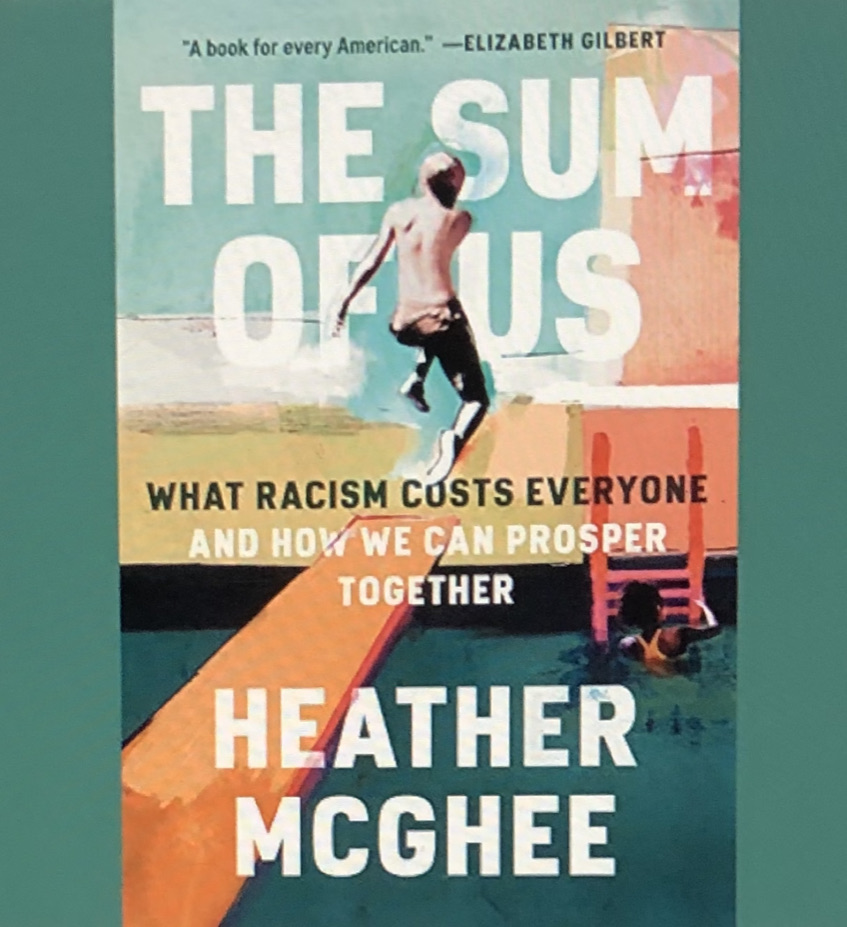

Some times a book is written that explains a lot about why we, as a nation, are the way we are. Given the disasters that we have gone through over the past year, I suspect that many of you have asked, but why does it have to be that way? I know I have. I believe that Heather McGhee has just published such a book, The Sum of Us: What Racism Costs Everyone and How We Can Prosper Together. She examines the cost of racial discrimination in the U.S. and makes the case that all our discriminatory laws and practices that have targeted Black people have also had a negative impact on all of us. She offers a framework for the true cost of the zero sum game that is so often played in our land of opportunity and she proposes that it is this racist and mistaken notion that you can only succeed if someone else loses that is behind it. And although I have not yet read the entire book, I believe she states that we will not solve our racial and decisive issues until the majority understand that they cannot prosper until all have the opportunities to prosper. I have felt this way for as long as I can remember, but Ms. McGhee provides the numbers and facts to support this concept. I have often wondered why so many, especially poor people, seem to favor leaders and programs that, to me at least, are not in their best interests.
I mentioned how important I think this book is at our Open Mike this week. As a followup Dani Tuji (Mike) Jones, another Open Mike participant, found the NPR interview provided below and shared his own story. Dani said, “When you mentioned the book I recalled how devastating the White backlash was to the overall economy where I grew up after the Civil Rights Act of 1964 was passed. The movie theater closed rather than integrating seating, the largest agricultural crop was shade tobacco and the farmers refused to pay minimum wages; they stopped farming instead. I don’t think Gadsden County ever recovered. . . Gadsden County tried replacing shade tobacco with tomatoes and mushrooms but today hundreds, perhaps thousands of acres of good arable land lie fallow. Neighboring counties grow soybeans, peanuts and cotton but not in Gadsden.”
Dani went on to say, “I recall how some of my high school teachers took retirement rather than teach integrated classes. I graduated in 1964 and joined the Marines that November so I missed the local pain. It was 1969 before I separated from the Corps and began to live in Tallahassee so most of the initial stuff was over but there were lots of remnants. The tobacco farming was a huge part of local agriculture and employed thousands directly. My aunt’s husband was a crop duster who flew almost every day during the season. He was suddenly out of the shade tobacco business. He did peanuts, soybeans and cotton in Georgia, cotton in Louisiana, and cotton in Nicaragua. Even though he was able to compensate for the loss of the tobacco business he had to go out of state to do so. He was fortunate compared to the field hands, both black and white, as well as the warehouse workers. The vitriolic hatred that resulted in a damn you if I am going to treat “them” as equals, I’ll close up shop first was not just mean spirited and spiteful it was dumb. The gigantic rock tossed in the lake produced tsunami like initial waves but the ripples continued for decades.”
Dani’s mom favored the phrase, “Don’t cut off your nose to spite your face,” while McGhee employs the metaphor of a drained, cracked public pool to make her point: “White refusal to share resources available to all US citizens doesn’t just hurt people of color. It damages their families and their future, too.” She blames this “Drained-pool Politics” for our inefficient health care systems, our failing infrastructure, our dysfunctional political system, and much else that is wrong with our country. She uses the story of the Fairground Park pool in St. Louis as an example. Built in 1919, it was the largest public pool in the US, but when faced with integration it was closed and drained.
CLICK for NPR interview with Heather McGhee on her book The Sum of US.



Add comment